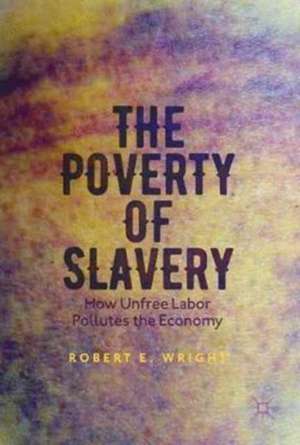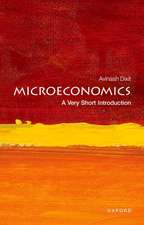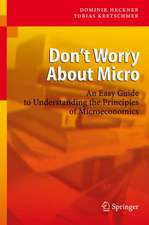The Poverty of Slavery: How Unfree Labor Pollutes the Economy
Autor Robert E. Wrighten Limba Engleză Paperback – 6 feb 2017
This ground-breaking book adds an economic angle to a traditionally moral argument, demonstrating that slavery has never promoted economic growth or development, neither today nor in the past. While unfree labor may be lucrative for slaveholders, its negative effects on a country’s economy, much like pollution, drag down all members of society. Tracing the history of slavery around the world, from prehistory through the US Antebellum South to the present day, Wright illustrates how slaveholders burden communities and governments with the task of maintaining the system while preventing productive individuals from participating in the economy.
Historians, economists, policymakers, and anti-slavery activists need no longer apologize for opposing the dubious benefits of unfree labor. Wright provides a valuable resource for exposing the hidden price tag of slaving to help them pitch antislavery policies as matters of both human rights and economic well-being.
Preț: 352.31 lei
Nou
Puncte Express: 528
Preț estimativ în valută:
67.41€ • 70.57$ • 55.78£
67.41€ • 70.57$ • 55.78£
Carte disponibilă
Livrare economică 15-29 martie
Preluare comenzi: 021 569.72.76
Specificații
ISBN-13: 9783319489674
ISBN-10: 3319489674
Pagini: 250
Ilustrații: IX, 302 p.
Dimensiuni: 148 x 210 x 17 mm
Greutate: 0.38 kg
Ediția:1st ed. 2017
Editura: Springer International Publishing
Colecția Palgrave Macmillan
Locul publicării:Cham, Switzerland
ISBN-10: 3319489674
Pagini: 250
Ilustrații: IX, 302 p.
Dimensiuni: 148 x 210 x 17 mm
Greutate: 0.38 kg
Ediția:1st ed. 2017
Editura: Springer International Publishing
Colecția Palgrave Macmillan
Locul publicării:Cham, Switzerland
Cuprins
1. Yet Another Half Untold.- 2. Various Degrees of Liberty.- 3. A Not So Peculiar Institution.- 4. Slavery Resilient.- 5. That Which is Seen: Enslavers' Profits.- 6. That Which is Unseen, Part I: Slavery’s Pollution.- 7. That Which is Unseen, Part II: Slavery’s Hidden Costs.- 8. Real Abolition.
Recenzii
“Wright’s book ought to be considered as the synthesis of an underappreciated analytical tradition regarding the broader economic consequences of slavery.” (EH.Net, May, 2018)
Notă biografică
Robert E. Wright is the Nef Family Chair of Political Economy at Augustana University, USA. He has co/authored or co/edited two dozen books on US economic history and policy, including Corporation Nation, Fubarnomics, and One Nation Under Debt. He has served on the board of Historians Against Slavery, an NGO, since 2012.
Textul de pe ultima copertă
This ground-breaking book adds an economic angle to a traditionally moral argument, demonstrating that slavery has never promoted economic growth or development, neither today nor in the past. While unfree labor may be lucrative for slaveholders, its negative effects on a country’s economy, much like pollution, drag down all members of society. Tracing the history of slavery around the world, from prehistory through the US Antebellum South to the present day, Wright illustrates how slaveholders burden communities and governments with the task of maintaining the system while preventing productive individuals from participating in the economy.
Historians, economists, policymakers, and anti-slavery activists need no longer apologize for opposing the dubious benefits of unfree labor. Wright provides a valuable resource for exposing the hidden price tag of slaving to help them pitch antislavery policies as matters of both human rights and economic well-being.
Caracteristici
Refutes claims that slavery aids economic growth and development Redefines and broadens the spectrum of unfree labor Succinct but historically and geographically comprehensive Uses the theory of externalities in lieu of standard neoclassical analysis












